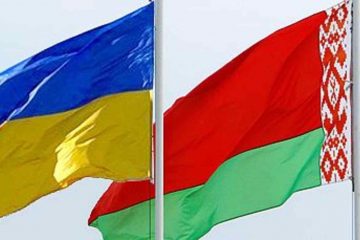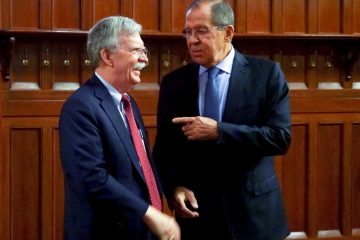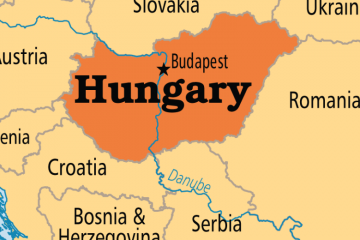Igor Kuzyo, a nightclub bouncer from Lviv, received a draft notice last summer. But rather than join the Ukrainian army, he travelled east and signed up with a volunteer battalion. At least 30 of these loosely regulated brigades have sprung up in eastern Ukraine to help the short-handed army fight. Their choice is a telling one.
“They don’t give you anything in the army, the equipment is bad, and they leak secrets even worse than in the interior ministry [which oversees his Saint Mary volunteer battalion],” said Kuzyo. “We have generals who just sit in the rear, they’ve never even shot their weapons,” he added. “We need more military expertise from the United States or UK.”
Several weeks after David Cameron announced that Britain would be sending military advisers to help troops involved in the conflict with pro-Russia rebels in eastern Ukraine, UK military instructors have arrived to provide medical and tactical training to local troops, the defence ministry in Kiev said on Thursday.
A spokesman, Oleksandr Motuzianik, did not specify the number of instructors, but said training would be rolled out over a two-month period. The BBC reported that 35 instructors had already begun training in the southern city of Mykolaiv. More are expected to arrive in the coming weeks.
Cameron’s announcement last month was met with mixed feelings by troops on the ground, many of whom want the west to send arms as well. The move is unlikely to alter the balance between government troops and Russia-backed rebel forces, although a Ukrainian military expert said it could have a positive long-term effect on the military’s long-term struggle to train and equip new men.
At the start of the conflict, Kiev’s army was short on manpower, modern equipment and knowhow. The annexation of Crimea and ensuing Russia-backed uprising in the east caught it unprepared. Ukraine reportedly had only 6,000 battle-ready troops. Their equipment was outdated and ill-maintained, since army purchases were notoriously corrupt.
Alexander Lapko, a senior specialist at the Nato liaison office in Kiev, wrote in October in the New York Times that his family had to spend $2,400 (£1,615) on a uniform, boots, gun sight, flak jacket and helmet for his brother, who was issued only a Kalashnikov assault rifle when he joined the army last year. Training has also been lacklustre.
An elite British soldier of Ukrainian descent, who resigned to train Kiev’s forces, recently told the Sunday Times that six in 10 Ukrainian casualties were caused by friendly fire or mishandling of weapons. Commanders were so incompetent that they were endangering soldiers’ lives.
“Everything I saw was contrary to everything I was taught in the British army,” said the man, who would give only his codename, Saffron.
Now, even after 10 months of war, these problems remain – and they are likely to be all too visible to the first western military trainers in the country.
The relatively small number of British instructors belies the impact the advisers can make, according to Oleksiy Melnik, an analyst at the Razumkov Centre in Kiev who previously worked at the defence ministry. “One of the approaches the British use is to train the trainers, and this is the way to affect the situation,” he said. “The results will multiply.”
Some US military personnel are set to train Ukrainian troops this spring, and the UK has had a resident defence adviser in Kiev for a decade, mainly to consult on possible reforms. But the new deployment of advisers marks a step forward, Melnik said.
Under former president Viktor Yanukovich – ousted last February – planned reforms of the army remained largely unfulfilled. Although the draft had been cancelled in 2013 as part of reforms to build a professional fighting force, the army remained full of poorly trained conscripts as the political regime changed in February 2014.
The conflict in the east created a still greater need for manpower even though time and resources for training were scarce. Earlier this year, Kiev said it had expanded its military forces to 200,000 men since the start of the conflict, mostly by mobilising those who had previously served. With the draft reinstated last year, the defence ministry plans to call up 40,000 conscripts and recruit 10,500 contract soldiers in 2015.
“Of course we need training to revitalise the army, to reform and teach so it will be ready for combat,” said the commander of a frontline checkpoint near Mariupol who would give only his call sign Cobra.
His unit, part of a volunteer battalion from Zaporozhiya that has been incorporated into the army command structure, went through about three months of physical and basic arms training before deploying to the front, he said.
After nearly a year of war, Kiev’s military has gained battle experience, but “it’s hard to talk about a real improvement” in its overall condition, Melnik said. He hopes the British advisers will help to train lower-ranking officers in particular.
“At the level of non-commissioned officers, the British army is recognised around the world,” he said. “That’s where they can help more than anyone else.”
http://www.theguardian.com/world/2015/mar/19/volunteer-brigades-bridge-ukrainian-army-gaps-kiev-army





Comments